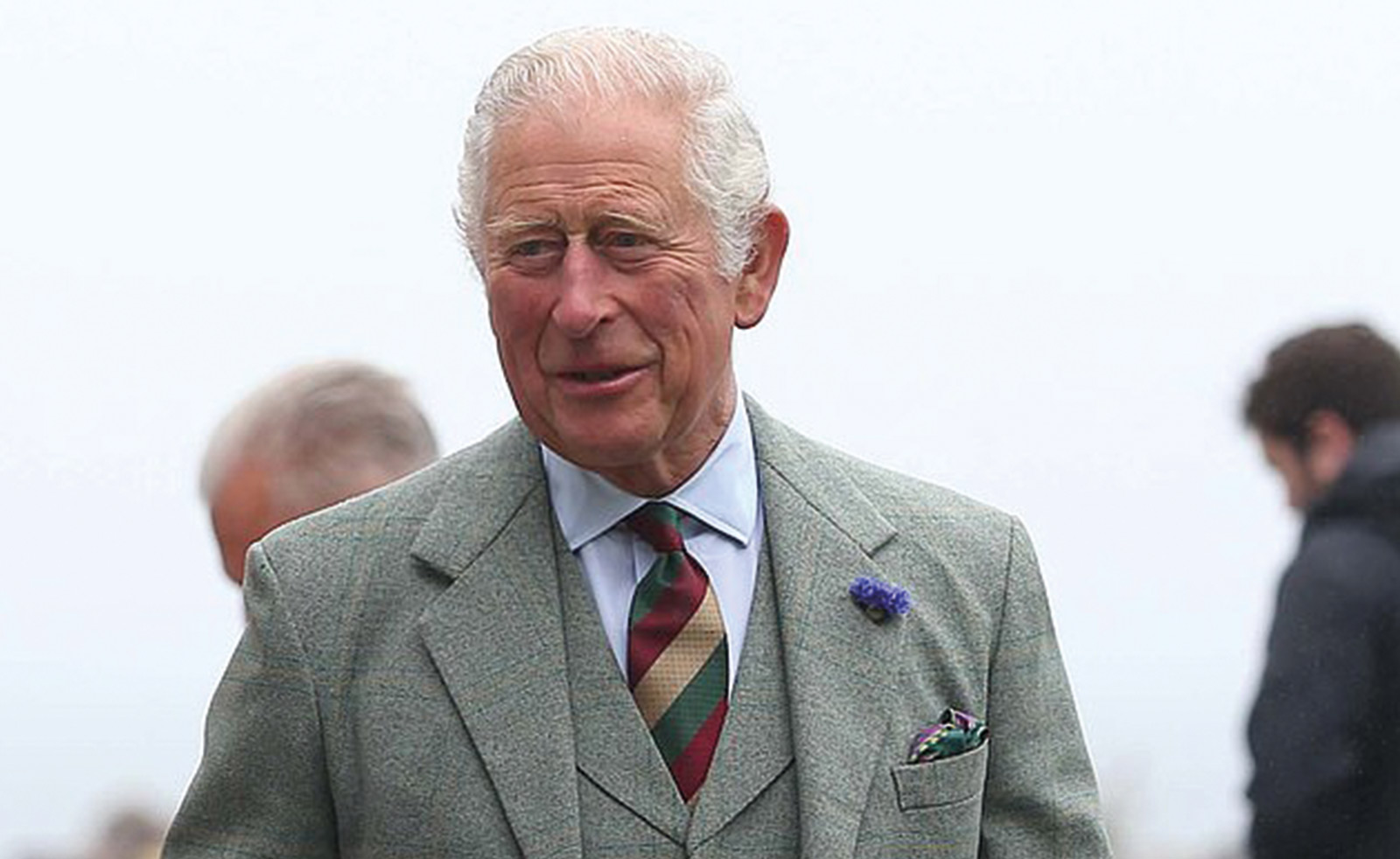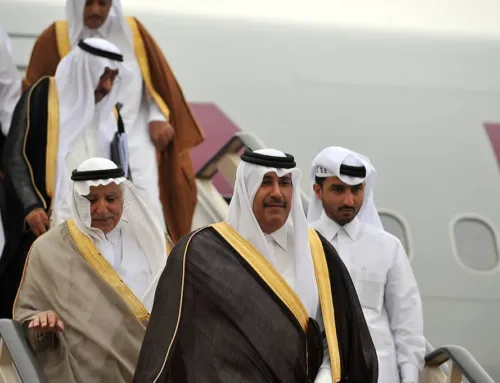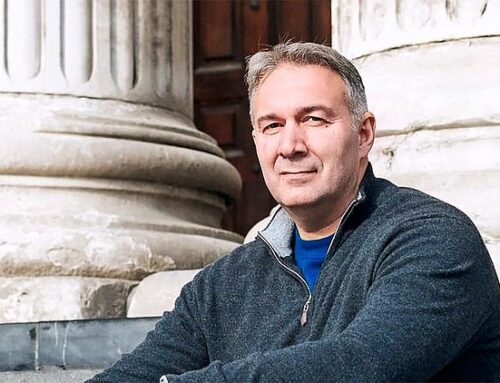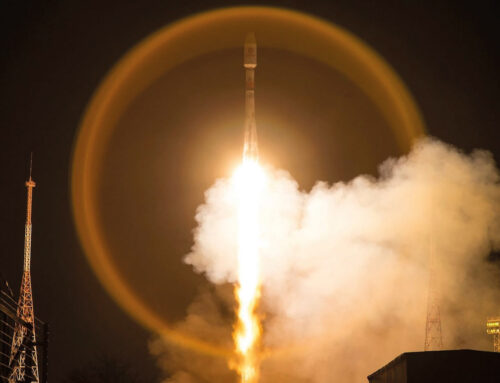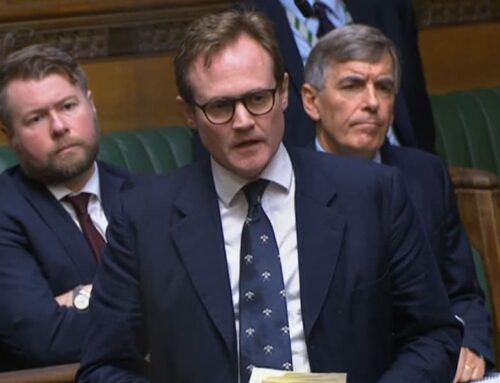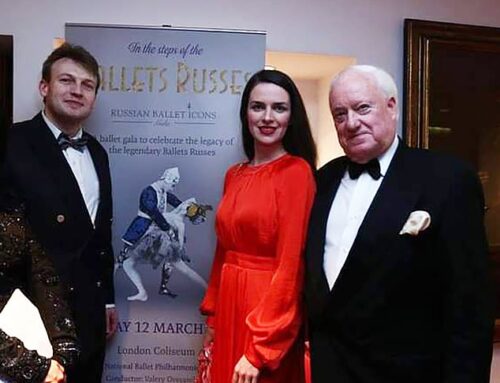By MARK HOLLINGSWORTH and KATE MANSEY FOR THE MAIL ON SUNDAY
|
- Supposed ‘cash for access’ scheme involving Prince Charles, uncovered by Mail on Sunday
- Claims that lavish wealthy donors could pay £100k to secure lavish dinner with the Prince of Wales
- Email suggests reveals Charles would greet each guest with a conversation and a photo
- Payments intended for charity, but email details how fixers would get 25% of fees
A major ethics investigation was last night launched into an extraordinary ‘cash for access’ scheme involving Prince Charles, which has been uncovered by The Mail on Sunday.
A bombshell email reveals in excruciating detail how wealthy donors could pay £100,000 to secure a lavish dinner with the Prince of Wales and an overnight stay at Dumfries House, his country mansion in Scotland.
The payments were intended for Charles’s charity ventures, but the email details how fixers would pocket up to 25 per cent of the fees.
A spokesman for the Prince last night said he was unaware of the cut being taken by middlemen and his foundation has now severed links with two men involved in the scheme.
The furore will be highly embarrassing for Charles, whose reputation risks being damaged by accusations that an association with him can be bought.
Critics have accused the Royals of naively believing that donors are motivated by philanthropy when, in fact, they are often seeking other benefits.
This newspaper has established that Dmitry Leus, a Russian banker who had a 2004 conviction for money laundering in Latvia overturned, cited a substantial donation to Charles’s charities when he was successfully lobbying the Home Office for full UK residency.
Mr Leus, who has also donated funds to Foreign Secretary Dominic Raab’s local Conservative association, included letters of gratitude from Clarence House in his application.
It is understood, however, that his invitation to Dumfries House in Ayrshire was subsequently revoked and his donation returned earlier this year.

Wealthy donors could pay £100,000 to secure a lavish dinner with the Prince of Wales and an overnight stay at Dumfries House in Scotland (pictured, Charles outside Dumfries House)
The email includes 14 bullet points setting out precisely what a donor can expect in exchange for paying £100,000 for two people to visit Dumfries House, the mansion that Charles secured for the nation in 2007 with a £20 million loan from his charity foundation.
After being driven to the Palladian house in a Royal car, they ‘can have a tour of house or gardens’. Clients, as the email describes them, assemble for drinks at 7pm and then meet Charles.
‘HRH appears and greets each guest individually with conversation and photographer,’ it adds.
A black-tie dinner and entertainment such as a piano recital follow before the guests retire for the night.
The email provides hope of a longer-lasting relationship with the Prince. Under the heading ‘Follow up’, it states: ‘Depending in [sic] the amount of synergy between each client and HRH, clients are placed on appropriate guest lists depending on their cultural interests.’
The email was sent by society fixer Michael Wynne-Parker on November 15, 2019, and sets out that 5 per cent of the fee will go to him.
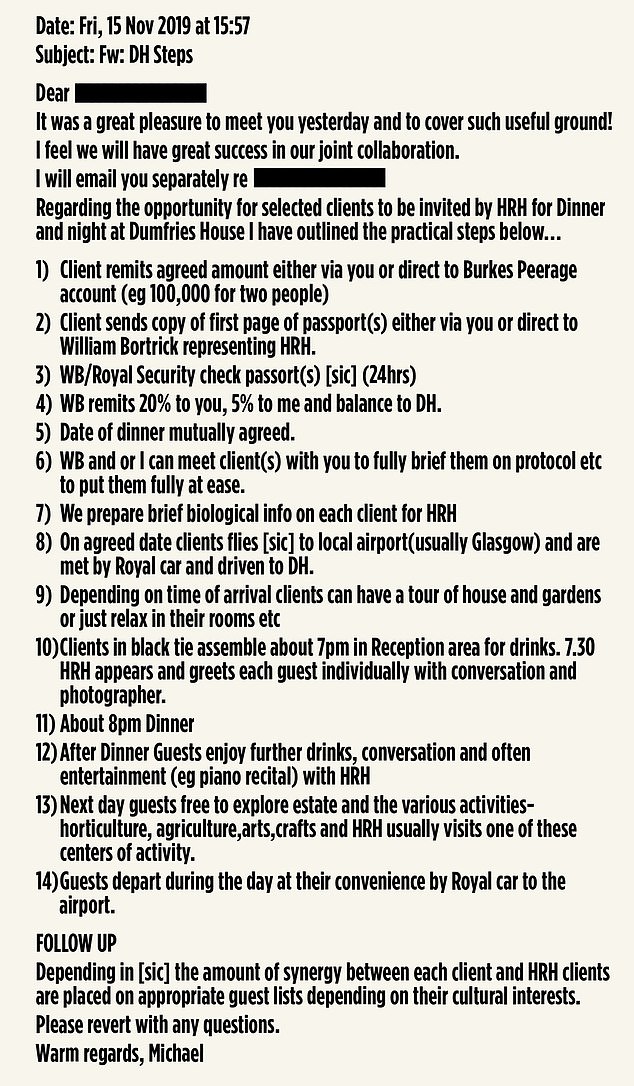
An email reveals that HRH would greet each guest with a conversation and a photo with payments intended for Charles’s charity ventures

The funds are paid to the account of Burke’s Peerage, the guide to the gentry, whose editor William Bortrick (pictured) was closely involved in the scheme but he denied any impropriety and of having any ‘business arrangement or agreement’ with Mr Wynne-Parker
It claims the funds are paid to the account of Burke’s Peerage, the guide to the gentry, whose editor William Bortrick is named as being closely involved in the scheme. A further 20 per cent goes to another middleman.
Last night, a spokesman for the Prince’s Foundation, which has overseen the massive project to regenerate Dumfries House, said its ethics committee to investigate and that he would no longer work with Mr Wynne-Parker or Mr Bortrick.
‘The Prince’s Foundation takes very seriously the allegations brought to its attention by The Mail on Sunday relating to third parties who have introduced prospective donors to our charity in the past,’ he said.
‘We were not aware of any financial gain being sought by these individuals, whom we have never paid, and have ceased our relationship with these individuals and referred the matter to our ethics committee for investigation.
‘Michael Wynne-Parker does not represent The Prince’s Foundation and the email he sent is not representative of the Foundation’s approach to fundraising’.
Wynne-Parker last night said that donors to the Prince’s Foundation tended to give ‘between £100,000 and £1 million’ and insisted it was ‘normal practice’ for intermediaries to be paid a commission for facilitating charitable donations.
Asked why the funds were paid into the Burke’s Peerage account, he said: ‘I was advised this [was] to be the vehicle. I believe this often happens.’
Mr Wynne-Parker said he had previously arranged similar donor dinners at the Castle of Mey, the Queen Mother’s former Scottish home which was opened to the public by Charles, adding: ‘The Prince of Wales once told me how much he appreciated the support and liked to get to know donors.’
Mr Bortrick denied any impropriety and of having any ‘business arrangement or agreement’ with Mr Wynne-Parker.
He said: ‘If Michael wants to do business that’s fine, but it’s nothing whatsoever to do with me.
‘This is not something we’ve ever discussed and if he had talked to me about what he was sending out to people, I’d have hit the roof because it’s completely inappropriate.’
The investigation will be led by Douglas Connell, chairman of the Prince’s Foundation, and Dame Susan Bruce, chairman of its ethics committee.

A spokesman for the Prince last night said he was unaware of the cut being taken by the middlemen and his foundation has now severed links with two men involved in the scheme

